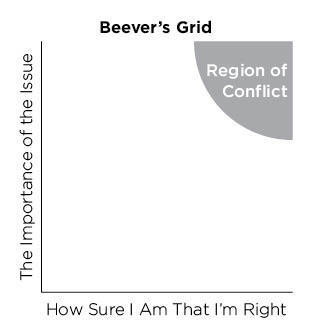Justin Taylor's Blog, page 199
July 26, 2012
Resources on Being Single in Christ
At the TGC Women’s Conference Jenny Salt did a workshop entitled “Singleness: What Does God Think?” (only audio available).
I thought it might be helpful to pull together a few resources I’m familiar with regarding singleness—for those who are struggling and for those who are looking for theological foundations to this discussion.
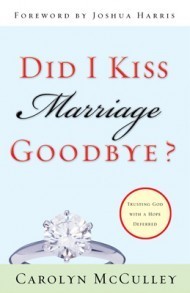 Carolyn McCulley, Did I Kiss Marriage Goodbye? Trusting God with a Hope Deferred.
Carolyn McCulley, Did I Kiss Marriage Goodbye? Trusting God with a Hope Deferred.
“This book is one of the most biblical, substantive, and helpful resources I am aware of on this topic. Carolyn gives single women a map to help them discover God’s purpose, mission, and calling for their lives. Her writing is engaging, practical, thought-provoking, and refreshingly transparent. I am confident that every woman who reads this book will be greatly blessed, challenged, and encouraged.”
—Nancy Leigh DeMoss, author, radio host, Revive Our Hearts
“Carolyn McCulley has written a remarkable book, biblically saturated and Christ-exalting. Her words are wise, encouraging, personal, and much needed. I highly recommend it.”
—Randy Alcorn, author; founder and director, Eternal Perspectives Ministries
 Lydia Brownback, Fine China Is for Single Women Too
Lydia Brownback, Fine China Is for Single Women Too
“This wonderful little book proves that fine theology obviously is for single women. Every woman who partakes of the truths served here will discover a feast of encouragement that will nourish her soul and enable her to live a life of joy and zealous service.”
—Elyse Fitzpatrick, Author of Idols of the Heart
“Though specifically written for single women, this important book will engage the entire Christian community. Lydia Brownback directs us to Scripture to clarify how we can find contentment regardless of our situation. A superb book.”
—Vesta Sproul, Ligonier Ministries
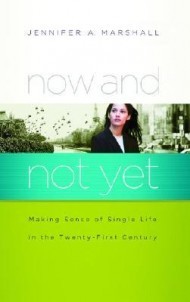 Jennifer Marshall, Now and Not Yet: Making Sense of Single Life in the Twenty-First Century
Jennifer Marshall, Now and Not Yet: Making Sense of Single Life in the Twenty-First Century
“Jennifer Marshall has a fresh, positive, God-centered perspective on singleness as one of the many callings we live by in the Christian life. Now and Not Yet is about much more than marital status; it is about loving and serving Jesus in the space between the way things are and the way we expect them to be. Marshall is honest about life’s struggles and open to the legitimate desire to be married during what she calls “the unexpected in-between.” What she writes is full of biblical and practical wisdom for pursuing single-minded devotion to God and finding joyful contentment in His unique plan for your life.”
—Philip Graham Ryken, President, Wheaton College
“With sensitivity and a sharp-edged knowledge of God’s Word, Jennifer Marshall reveals the sweet and satisfying answer to our deepest longings, helping us all—whether married or single—find true pleasure in God. Thank you, Jennifer, for shining so much light on an oft-troubling topic.”
—Joni Eareckson Tada, JAF International Disability Center
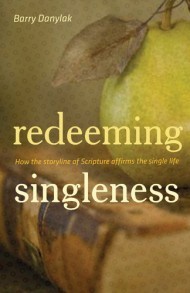 Barry Danylak, Redeeming Singleness: How the Storyline of Scripture Affirms the Single Life.
Barry Danylak, Redeeming Singleness: How the Storyline of Scripture Affirms the Single Life.
John Piper’s foreword:
The greatest, wisest, most fully human person who has ever lived, never married. Jesus Christ. His greatest apostle never married, and was thankful for his singleness. Jesus himself said, that in the age to come we do not marry. And he added that the age to come had already broken into this world.
Therefore, the presence of single people in the church not only “attests the sufficiency of Christ for the reception of God’s covenantal blessings in the new covenant,” but also reminds us “that the spiritual age has already been inaugurated in Christ and awaits imminent consummation.”
When I met Barry Danylak at Tyndale House in Cambridge, England, in the summer of 2006, I was amazed at the research he was doing on a biblical theology of singleness. Not only was the scope of it unprecedented, but the theological and practical insights struck me as biblically compelling and practically urgent. I don’t know of anyone else who has ever provided the extent of biblical reflection on singleness that Barry has provided for us here.
Both marriage and singleness demand the most serious and solid biblical insight. These are realities that affect every area of our life and thought. We cannot settle for superficial pep talks. Our lives cry out for significance. And significance comes from seeing ourselves the way God sees us. Including our singleness. My guess is that virtually every single who reads this book will finish with a sense of wonder at who they are, and how little they knew about this gift and calling.
Barry is keenly aware of the progress of redemptive history and its stunning implications for the single life. Early in that history, marriage and physical children were fundamental to the blessings of the Mosaic Covenant. But they are not fundamental to the New Covenant the way they were then. And what is beautiful about the way Barry develops this historical flow is that the glory of Jesus Christ is exalted above all things.
Barry elevates but does not absolutize the calling of the single life. It’s greatness lies in this: “It is a visible reminder that the kingdom of God points to a reality which stands beyond worldly preoccupations of marriage, family, and career.” Indeed. And that greater reality is the all-satisfying, everlasting friendship of Jesus himself in the new heavens and the new earth. Marriage and singleness will be transcended, and Christ himself will make those categories obsolete in the joy of his presence. A life of joyful singleness witnesses to this.
And finally, a sermon by John Piper:
Jonathan Merritt, Transparency, and the Ethics of Gay Outing
 Ed Stetzer introduces Jonathan Merritt:
Ed Stetzer introduces Jonathan Merritt:
. . . Recently, after Jonathan, in a piece written for The Atlantic, defended Chick-fil-A against a potential boycott by gay activists, a “gay evangelical” blogger claimed he had evidence Jonathan himself was gay. In the parlance the effort was to “out him.” Merritt’s defense of Chick-fil-A had already exploded in the LGBT blogosphere, but this inflamed the issue as many sought to discredit Jonathan after he dared to defend Chick-fil-A.
Jonathan’s views have been clear–he considers homosexual practice as sin and is not in favor of redefining marriage (about half of America agrees, btw). Such views make you a target today, regardless of your personal situation.
“Outing,” in case you do not know, is the practice of revealing that a certain person is gay without his or her consent, is not an unheard of occurrence though it is not always looked on favorably within the LGBT community. My heart grieves to see such low integrity, particularly when done by a person who claims the title “Christian”–and I am deeply disappointed with a few “Christians” in the blogosphere, who, since they disagreed with Jonathan in the past, seized the moment. Sad.
Yes, Jonathan Merritt is a public figure who lives in the intersection of church and culture, and is accustomed to cars coming from both directions–which appears to be the case now. In the past I have used my blog as a way for leaders to address blogosphere issues (see this interview with Rick Warren, for example) I want to do the same today.
So, I asked Jonathan if he would take a few questions and respond to this situation for himself. He has agreed, and I welcome him to the blog today.
You can read the whole interview here.
Living in a broken world as we are, I’m sure that we will see more of this in the days to come: Christian leaders struggling with same-sex attraction. Some will succumb, and some will fight for purity and obedience by grace through faith. I commend Jonathan for his honesty, and Ed for seeking to provide a forum to do this in the right way, just as I lament the utterly unconscionable actions of professing believers who seek to take political-theological advantage of rumors and pain.
RefNet: 24-Hour Christian Radio on the Internet
Ligonier Ministries is making available a resource that I hope spreads far and wide: a free, always-streaming, 24-hour Christian internet radio featuring solid biblical teaching and preaching. Go here for more information. There you’ll find info on how to access this via your computer, your iResources, and other mobile devices.
Chris Larson writes:
You’ll hear Renewing Your Mind with Dr. R.C. Sproul, plus hundreds of teaching series, messages from our teaching fellows, and more than twenty-five years of conference messages. Ligonier has a digital library of many thousands of hours of solid Bible teaching and preaching, but up until this point we have been limited in ways to provide useful access to it. RefNet enables us to serve you better with unique daily teaching and preaching.
RefNet is pleased to also feature the ministries of other broadcast partners who echo the same great historic truths that have been well-framed by the creedal consensus coming out of the Reformation. RefNet includes broadcasts from Alistair Begg at Truth For Life, John MacArthur at Grace to You, John Piper at Desiring God, Albert Mohler with The Briefing and Thinking in Public, and many others. And you’ll hear daily news briefs from World Magazine and SRN News to help you stay current with that day’s headlines.
In the evening, families can enjoy biblically-based audio drama produced by Lamplighter Theater. We then move throughout the night into a blend of Bible reading, brought to you by our friends at Crossway Books, and pleasant music suitable to background listening.
I’m also hearing that Ravi Zacharias and Martyn Lloyd-Jones programs will be added soon.
I thank God for this investment and commitment by Lignoier, and I pray that this will greatly edify God’s global people—and add new sheep to the fold—for the glory of his name!
July 25, 2012
The Physical Theology of the Bible
A lecture on “Physical Theology: The Bible in Its Land, Time, and Culture” at Lanier Theological Library by Archaeologist and Professor John Monson (Wheaton College), delivered on February 11, 2012:
God has revealed Himself in time, space, and culture. People of faith from biblical times through today seek to live according to His purposes as reflected in the Bible. In this visual presentation Professor Monson will demonstrate how the original context of Scripture—the land, culture, and language—is valuable for understanding both the message of the Bible and its contemporary relevance. The ancient Israelites and Jews in later periods lived off the land and lived out their response to God through the law, the feasts, and the challenges of life in the land. The land was God’s testing ground of faith, and as we encounter the “physical theology” expressed in Scripture, we are better equipped to grasp the lessons it has for us today.
Covenants in Biblical and Systematic Theology
You can now read online for free the first two chapters from Peter Gentry and Steve Wellum’s Kingdom through Covenant: A Biblical-Theological Understanding of the Covenants (Crossway, 2012):
“The Importance of Covenants in Biblical and Systematic Theology”
“Covenants in Biblical-Theological Systems: Dispensational and Covenant Theology”
July 24, 2012
Loving Those Who Grieve

Photo credit: Benjamin Mårtensson (http://eco.nu/p/120)
I once asked Matt Chandler about the unhelpful things people said to him in his fight against cancer. He refused to give examples but explained, “I think people can get a little weirded out by pain, suffering, and death. They don’t know what to do so they end up saying things that are hurtful to people who have experienced loss.”
For those of us self-aware of the propensity for foot-in-mouth disease, we sometimes choose simply to ignore those who are hurting so that we don’t make things worse.
Jill Sullivan, who lost a 16-year-old daughter to a highly aggressive form of brain cancer, explains why it can be so hard to return to church after the death of a loved one. She writes:
Our churches are full of people who are hurting, many of whom have lost children or other loved ones. For me personally, returning to church was one of the most difficult things to do after my loss, and I’ve talked to many other bereaved parents who have expressed the same thing.
She offers some reasons why this might be the case:
Families tend to sit together at church, and when your family is missing someone, their absence is particularly acute in the pew. Looking around and seeing other intact families worshiping beside you can also be very painful.
The songs we sing in church can bring up very strong emotions. Songs about heaven can conjure up an almost unbearable longing in our hearts, and songs of praise can be difficult to sing when your heart is broken.
There is an unspoken expectation at church that everyone is filled with the “joy of the Lord.” You know what I mean . . . we put on our best clothes and our Sunday School smiles and give the appearance that all is right in our world. A grieving parent may simply not have the emotional stamina to play that role.
She then asks, “So how do we as the body of Christ reach out to bereaved parents and give comfort without adding to their pain?”
Here are her suggestions for both those who are grieved and for those who can comfort:
Be patient with them. Grief is a marathon, not a sprint, and it’s important to respect the fact that people need time to heal. The grieving parent may not be ready to resume regular church activities right away, whether that’s teaching Sunday School, singing in the choir, working in the nursery, or greeting at the door.
Grief comes in waves. Don’t assume that a person is “over it” if you see them smiling or laughing, and don’t assume that a person is “not doing well” if you see them grieving outwardly.
They may not be interested in small talk. Someone who has lost a child is grappling with deep spiritual issues and may not be interested in shallow conversation. Listen to them if they want to talk, and don’t feel that you need to answer all their questions. Remember how well it went over once Job’s friends started talking!
Grieving people are vulnerable and often hyper-sensitive, and they may have been hurt by things that well-meaning people have said to them. Some of those things might include:
“I know what you’re going through. My grandmother died last year.”
Something along the lines of “God always picks His best flowers first” or “God must have needed another angel in heaven.”
“She’s in a better place.” (There’s nothing really wrong with that because it’s true…it’s just that the grieving person really wants their loved one here with them!)
“It’s a good thing you have another child.”
They also may have been hurt by those who have intentionally avoided them or who have said nothing to them at all. So what should we say to a grieving mom or dad?
“I love you, and I’m praying for you.”
She writes, “That’s it? Could it be that simple? Yes, it really is. This statement, maybe accompanied by a warm hug, is all that’s needed to assure a bereaved parent of your care and concern.”
You can read her whole post here.
For those who are grieving, this workshop from Nancy Guthrie (at the TGC Women’s Conference) may prove instructive and edifying.
Audio here.
See also this interview with her about making the church safe for grieving people.
Nancy tells her own story of profound suffering—the death of two of her children in infancy from Zellweger syndrome—in the book Holding On to Hope: A Pathway through Suffering to the Heart of God. Since that time she has gone on to write additional books exploring God’s comfort in suffering—for example, When Your Family’s Lost a Loved One: Finding Hope Together and Hearing Jesus Speak into Your Sorrow. She has also edited two relevant collections of classic and contemporary essays: Be Still, My Soul: Embracing God’s Purpose and Provision in Suffering and O Love That Will Not Let Me Go: Facing Death with Courageous Confidence in God.
When Should I Correct and When Should I Let It Go?
In the appendix to Sam Crabtree’s Practicing Affirmation he reproduces a helpful grid:
(Beevers’ Grid copyright 1986 by Ernest Beevers. Used by permission.)
Crabtree explains (pp. 161-162) how this can be used to help determine when to correct someone and when to let it go.
The vertical axis indicates the importance of the issue being considered. The bottom reflects issues of low importance such as trying to resolve whether President George Washington ever wore socks that didn’t match. It is an issue of virtually no consequence. Moving up the axis, toward the top we reach issues that are important, issues that have life-and-death significance, perhaps for a great many people. Between the top and the bottom is an array of issues and their relative importance or unimportance.
The horizontal axis indicates my certainty that I am right. Toward the left are issues about which I don’t have the foggiest clue (what is the name of the dog owned by the bit player in that 1938 movie that no one saw?). Toward the right are issues about which I am sure that I’m sure before God, the angels, and all the witnesses that could be summoned that I am right. Most people find that there are surprisingly few of these issues.
Any issue of controversy can be plotted on this matrix.
The lower-left quadrant contains issues that meet two simultaneous criteria: (1) they are of low importance, and (2) I do not know much about them. For example: how many angels can dance on the head of a pin? Who knows? And who cares? Here’s the point: it wouldn’t be worth consuming relational energy to argue about this issue or to correct someone else’s viewpoint.
The upper-left quadrant contains issues that meet two simultaneous criteria: (1) they are of high importance, but (2) I still don’t know with certainty what the truth is. For example: When is Jesus returning? That is of crucial and everlasting importance to every person who lives or ever has lived! And yet I don’t know when he’s coming back. One of the things about which I’m certain is that I am not certain about exactly when he’s returning. The point is: arguing about it or correcting others is not worth the relational energy it would consume.
The lower-right quadrant contains issues about which (1) I’m certain I’m right, but (2) they are of low importance. For example: how many knots are in the log I am now looking at? I know the answer, but why make an issue of it?
And now we arrive at the main observation to be derived from Beever’s Grid. The upper-right quadrant simultaneously contains the issues (1) that are important, and (2) for which there is virtually no possibility that I will be shown to be mistaken.
And here’s the point: reserve your conflict, your arguments, and your persistent corrections to that quadrant.
Here’s its corollary: keep that region small. The fruitfulness of correction tends to come from a smaller region than we assume. We default to making that region larger than is fruitful. We wear people out by putting more issues in the upper-right quadrant than belong there.
(Emphasis mine.)
No Ordinary Marriage: Together for God’s Glory
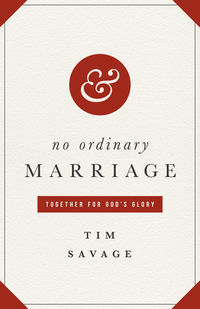 Tim Savage’s new book, No Ordinary Marriage: Together for God’s Glory, is undoubtedly the first (and probably the last) to be endorsed by both Kevin Vanhoozer (a rock star of theologians) and Alice Cooper (a rock star of rock stars).
Tim Savage’s new book, No Ordinary Marriage: Together for God’s Glory, is undoubtedly the first (and probably the last) to be endorsed by both Kevin Vanhoozer (a rock star of theologians) and Alice Cooper (a rock star of rock stars).
Vanhoozer writes:
No Ordinary Marriage is an extraordinary book. What makes this work stand out in an overcrowded marketplace of ‘how to’ books is its compelling vision of marriage for the glory of God. I know of few books on marriage that combine elegant writing, sound doctrine, clear illustrations, and practical advice in equal measure. This is a book on marriage made in heaven. No one, or couple, who reads this book will look at marriage in an ordinary way again.
Cooper writes:
No Ordinary Marriage explains how a marriage is intended to glorify God. Dr. Tim Savage writes not in a spirit of condemnation, but rather of encouragement as he paints a picture of what marriage is really meant to be. In reading this book, Sheryl—my wife of nearly 36 years—and I found ourselves challenged and inspired to rely on God as the core of our marriage.
Savage, whose PhD is in the New Testament from Cambridge University, is pastor of Camelback Bible Church in Paradise Valley, AZ.
You can read the introduction and chapter 2 online for free.
Here is a conversation we recently had about the book and the keys to having a gospel-centered marriage for the glory of God:
July 20, 2012
Who Is the Holy Spirit?
There is no one I would rather hear teach on the Holy Spirit than Sinclair Ferguson, the author of a very good book on The Holy Spirit.
You can watch below for free the first 25-minute lesson. Go here to order or download the whole series in video or audio, plus a study guide.
July 19, 2012
Piper and Keller on Sanctification Continued
Part 1 was here. Part 2:
0:01 — When action is enticed by a blessing.
3:00 — Looking for the past and future for sanctification now.
4:44 — How pleasure relates to our motives.
7:10 — The battle against pornography and being a “John Owen guy.”
11:10 — Three levels of motivation for holiness.
11:29 — Strategies and means of grace for holiness.
Justin Taylor's Blog
- Justin Taylor's profile
- 44 followers


